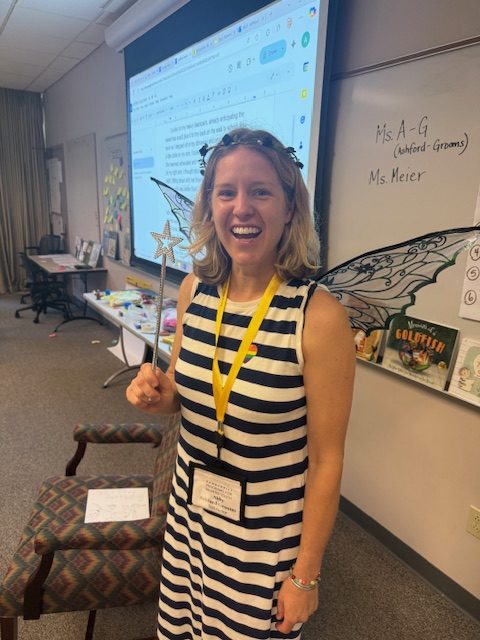What a week! It has been a true pleasure to spend these five days learning and creating with your precious children. Today was a special day because we transformed from mere mortals into accomplished authors! Ms. A-G, in fact, also transformed today–she became The Story Fairy! Wings, wand, and everything. It was a fun day!
Our morning was intense because we were under a tight deadline with our publisher, but once we got our stories sent to the press, we were able to relax and celebrate a bit in the afternoon. We started the day with a lesson on diction and figurative language. We talked about how writers have to make continuous choices about which words they select for their sentences and stories, and that words have different impacts and implications. I encouraged students to think carefully about their choice of words as they finished typing their story drafts. We also did a quick lesson on metaphors and similes and talked about how these can add spice to our stories.
By the end of the morning, each writer was able to complete the first draft of their story on a computer; however, we had to be patient with a few technology challenges. When our drafts were complete and headed to the printer, we wrote our “About the Author” mini-bios (check these out on the last page of the anthology that came home). Then our writers were assigned partners for peer review. Each writer read a classmate’s story and offered their best feedback for revision. The green paper that came home in their yellow folder will give you a sense of this process. Each reviewer was asked to provide a few “glows” and a few “grows” for their partner by evaluating them in the following areas:
- Show, don’t tell (description)
- Sensory details
- Character Development (transformation)
- Setting
- Problem
- Resolution
- Theme
- Structure (beginning, middle, end)
- Diction
- Figurative language or Dialogue
This was a challenging task for our young writers (it can be challenging for high school students too!), but I am so proud of how they were undaunted and remained dedicated to providing feedback to their partner. At this point, we were on a tight deadline, and we had minimal time for revision before our publisher needed our stories for final publication. I reminded students that writing is a process and that they can continue to revise and edit their pieces–even after publication! I told them about how even grown-up writers who have published numerous books and experienced great success will sometimes talk about how they wish they could go back and change a scene from a book that was published years ago! A curious mind is never satisfied. But alas! We couldn’t fight the clock any longer. The stories went to the printers.
After lunch, I read aloud the book The Best Story by Eileen Spinelli. We talked about how writing stories is not a competition and that each of them succeeded this week because they wrote their own story and persevered through many demanding lessons. We enjoyed a quotation from the end of The Best Story:
“Maybe I’ll win that roller coaster ride with Anne Miles, and maybe I won’t.
Either way, I’ll be happy. I’ll be a winner.
Because the story I wrote is my own.
Not somebody else’s.
And that makes it the best.”
After course surveys and a self-reflection on our personal transformations this week, each writer got to design a cover page for their anthology. Then we celebrated! Each writer got the opportunity to read their story aloud to the class (a few students asked me to read their story for them, but every story was read aloud). The audience was attentive, supportive, and kind, laughing at funny moments and cheering with gusto after each selection. We wrapped up our time together with anthology autographs and fond farewells.
Some dinner table conversation starters:
- What is diction? Why is it important for writers?
- What is the difference between a simile and a metaphor? How can figurative language enhance our writing?
- What was difficult about the peer review process?
- How did your peer review partner help you revise your story?
- What is the “best story”?
I am truly so proud of the growth that these sweet writers demonstrated in just five days. I told them this morning that they started the week as little caterpillars and said goodbye to me as beautiful butterflies. They will be in my heart forever.
Although writing isn’t a competition, writing competitions do exist and can be fun to enter! As a proud Iowa alum, I want to invite each of you to help your writer submit to the “100 Word MicroStory Contest” sponsored by the University of Iowa. Follow this link for more details: Write Now – Microstory Contest | University of Iowa Center for Advancement
All the best to each of you! I hope our paths cross again in the future.
–Abby Ashford-Grooms


